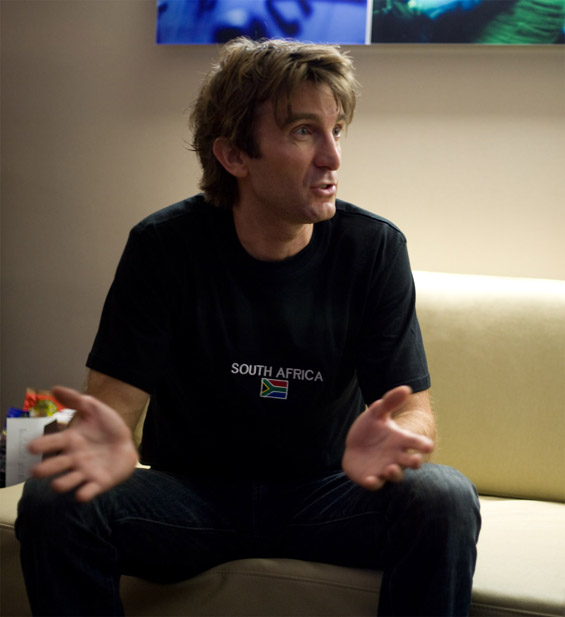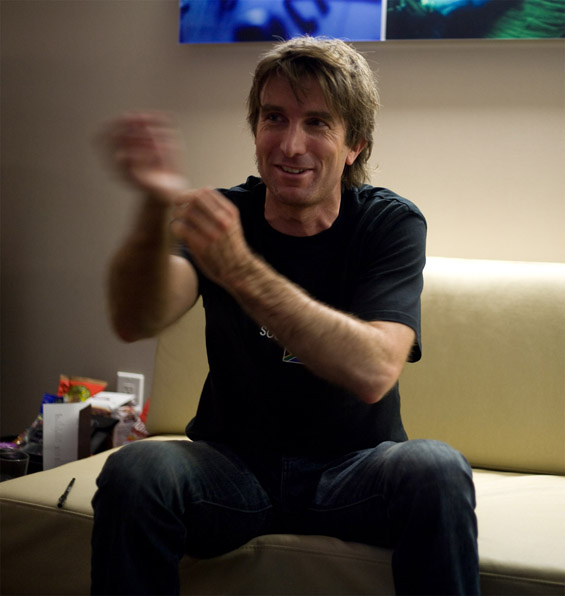Hey everyone. Capone in Chicago here.
Sharlto Copley is probably the first person who will tell you that he doesn't consider himself an actor, even after you watch his triumphant, startlingly confident performance in DISTRICT 9 as South Africa's ultimate nerdy bureaucrat, who has just been put in charge of relocating nearly 2 million aliens from a shanty town in Johannesburg, South Africa, to a new camp well outside the city limits. Copley has known DISTRICT 9 director Neill Blomkamp since they were high school, and eventually the two men got careers in entertainment. Copley became a television director and producer, while Blomkamp became a graphic designer and special effects expert, which led him to make several awesome shorts films using his abilities.

Capone: So last night was really the first of what I’m assuming will be many times where you are going to get swarmed after a screening. People wouldn’t let you leave. How did that feel?
Sharlto Copley: That was surprising. It was very surprising. I really thought we were just going to screen it and disappear, you know? That side of the business doesn’t really interest me, like getting attention or stroking my ego or whatever, like I’m a real filmmaker-at-heart kind of a person. I normally am behind the camera actually, so I didn’t have aspirations of “I want to be a famous,” but I’ve always done characters my whole life just for fun.
Capone: I was really surprised. I almost didn’t recognize when you came up on the screen after seeing you in the beginning. This really is a "character." How did you guys sort of come up with this ultimate bureaucrat?
SC: Neill [Blomkamp] and I having grown up in South Africa, we had the same frame of reference on a lot of things, and literally he told me in a sentence, he said “Imagine an OfficeCon's telecom worker,” which is a big telecommunications company, “who has a desk job, but every month or so he gets to go out, he has to go out and serve notices on these creatures and get in above his head basically.” That was the brief from him and from that I started with a voice, since that’s how I do my characters, I had two or three different voices I was playing with, and I found a voice that worked the night before we went to shoot a little test. We shot a test, like a five- or six-minute piece, that Neill cut together that was never released, but Peter saw it and based on the strength of that, that’s how it all went down.
Capone: Then came the facial hair and the haircut.
SC: I had shorter hair and I didn’t have the mustache, but I knew, in that culture, that guy would have a mustache. So I just added that to refine him, but from that first test, it was the same guy.
Capone: I love the way the way you and everyone have a matter-of-fact way of interacting with the aliens. For us as an audience, it’s shocking to see that level of casual behavior, but you forget it’s been almost 30 years of living with them.
SC: He’s had assertiveness training. He’s learned the language…[laughs]
Capone: That’s another thing, yeah, the creatures have been here so long that you can understand each other’s languages. Did you think much about your character’s life before the film? Where he came from? We learn little bits about his marriage and his childhood. What did you come up with?
SC: Absolutely. I am a character actor in the fullest sense, like I absolutely know this dude completely with anything and in any situation and any background, what kind of conditioning, the way he as brought up, why he would see the creatures the way he did, and all of that. It’s kind of by osmosis almost, you're getting these influences, so for me the character pops in almost fully formed in a way, and it’s a questions of fleshing out. If you ask me a question about the backstory that I hadn’t thought about, I would know it. If it were with the character, then I would know what would have happened.


-- Capone
capone@aintitcoolmail.com
Follow Me On Twitter




